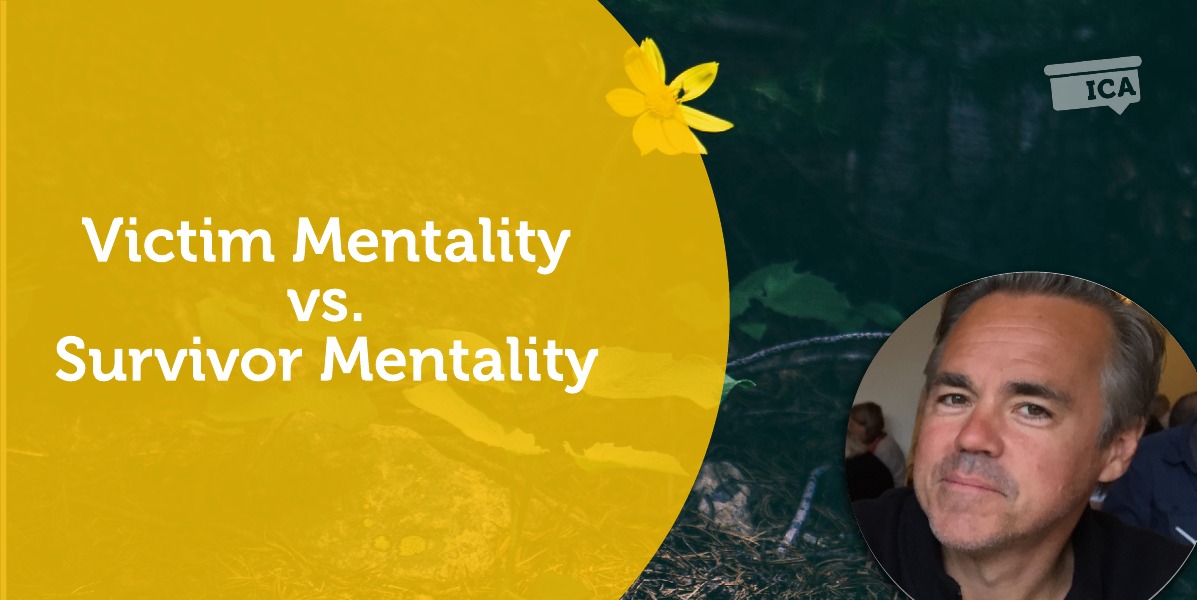A Coaching Power Tool Created by Peter Kennedy
(Executive Coach, FRANCE)
Introduction
What does it mean to have a victim mentality?
Merriam Webster Dictionary defines victim mentality as: ‘’The belief that one is always a victim: the idea that bad things will always happen to one’’. When an individual perceives him/herself as the target of the trauma, tragedy, abuse, or another negative factor in their lives to the point where it negatively affects his/her well-being.
A person suffering from a victim mindset often identifies with self-defeating emotions such as resentment, guilt, anger, and shame and often internally promotes harmful thoughts such as:
Self-defeating thoughts focus on negative triggering events and can be inaccurately applied to reflect something negative about the person.
What does it mean to have a survivor mentality?
A survivor mentality focuses on overcoming negative triggering events and helps to promote an individual’s adaptive behaviors. A survivor mentality includes thoughts like:
By emphasizing survival, we can transcend the constraints and challenges in our lives instead of being defined by them. Instead of suffering through vulnerability and helplessness, a survivor mentality allows one to enjoy the adaptive powers of resiliency and strength.
Moving from victim to survivor has to be a conscious choice because often, as people suffer through and identify with a victim mentality, they rarely realize they are doing it. They grow so accustomed to the misery of the self-defeating mindset that they forget they are fundamentally choosing to live life in such a constraining and often destructive way. To move on in life with health and vitality, we must break away from being a victim and transcend our suffering by fostering a survivor mindset and outlook.
Choosing a healthy and engaged life takes a lot of work, so much so that many people with a victim mindset often find it easier to do nothing concretely to improve. And it is especially hard when you’ve identified your traumatic experience as the cause of your misery for so long. Often, people who find themselves stuck in a victim mentality while being keenly aware of their suffering, nevertheless become complacent and lose the sense that they may be able to do something about it. They tend to internalize unhappy events and disappointments that are quite commonplace for others around them. All of this leads to a miserable entropy where the victim feels trapped in a cage without a key.
Coaching Application
Coaches can play an instrumental role in helping people transcend the unhappy and confining constraints that a victim mindset can create. Through patient facilitative coaching engagement, active listening, and powerful questioning, a coach can help a client with a victim mindset to identify aspects of her way of looking at things or believing which do not serve her today, especially if her goal is to be a more resilient and happier person. One particular area of attention which is often critical for healing and for moving towards a more survivor mindset is what is sometimes referred to as ‘underlying beliefs’.
Underlying beliefs are often described as ideas, thoughts, or assumptions that people accept and perceive as truths. These beliefs are formed often from the time we are young to address certain realities around us. They are typically unconscious beliefs that were programmed into us and which developed through certain life experiences and encounters with others. While certain underlying beliefs may have very well served us or protected us when we first developed them based on our experiences and needs at a certain moment in time, later in life they may not be relevant or useful at all and on the contrary may be extremely counterproductive. Through coaching, an individual may learn to move from self-judgment around the negative impact of certain beliefs such as the interference with a productive goal they may have, to accepting their constrained experience as an opportunity to explore, and through curiosity and careful exploration to ultimately identify the underlying belief which has been interfering with the achievement of their goal.
People experiencing a victim mindset typically have a host of underlying beliefs, often created when they were young, which as long as they remain unidentified and unlocked serve to perpetuate this mindset. As mentioned in the earlier definition, these typically include self-denigrating beliefs of being worthless, a failure; of never doing anything right, or somehow not deserving better than one’s lot. Through thoughtful reflection and inquiry with the help of a coach, a person may come to not only clearly identify the belief or beliefs which underpin their victim mindset, but eventually, come to ‘own them’ instead of judging them. This may open up the ability to see opportunities where such opportunities were missed before; it may lead to a shift in perspective or consciousness which allows the person to take action and choose a new belief or set of beliefs which can better serve them and allow them to adapt towards a survivor mentality. By focusing on our strengths and our capacity to survive, we can rise above life’s constraints and challenges instead of being defined by them. This is when true healing occurs and happier life begins to take hold.
References
“The Victim Mentality – What It Is & Why You Use It”. Counselling Blog. HarleyTherapy.co.uk (Harley Therapy Ltd.- Psychotherapy & Counselling in London). April 26, 2016 [2006]. Retrieved August 7, 2018.
Shirin, Dr. Kim K. “The Victim Mentality”. Articles. DrShirin.com. Archived from the original on March 27, 2007.
Byron Katie (2002). Loving What Is. New York, NY: Harmony Books
